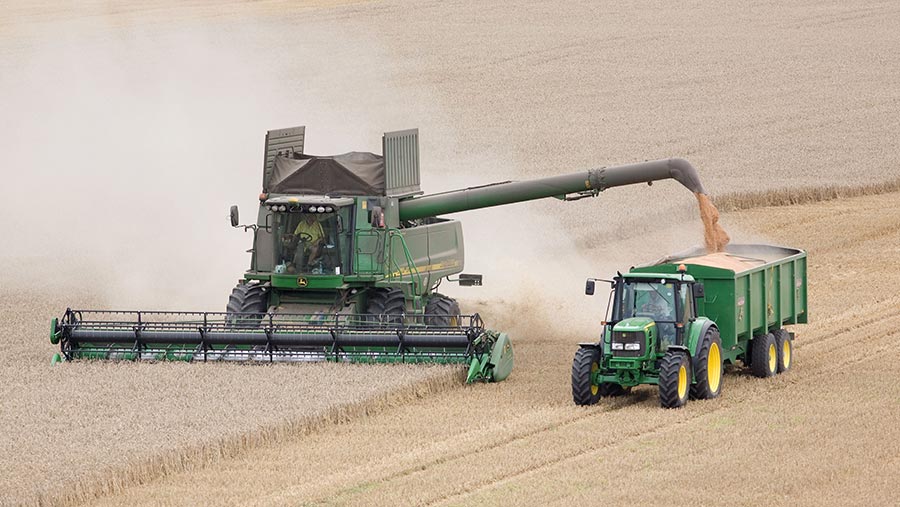Urgent measures needed to safeguard food security
 © Tim Scrivener
© Tim Scrivener Farm industry leaders have called for urgent action to tackle the threat to domestic food security posed by the war in Ukraine.
The call was made by Northern Ireland farm minister Edwin Poots and union leaders across Britain, and targeted at the government, supply chain representatives and banks.
In a letter to Defra secretary George Eustice, Mr Poots raised “serious concerns over the unprecedented rise in input costs” and shortfalls in fertiliser and maize.
See also: Ukraine war to squeeze farm margins as input inflation bites
“Compounding this, we are still dealing with the labour shortage crisis, especially in the pork sector,” he said.
Mr Poots called for a range of measures to alleviate pressures, including:
- Ensuring inputs for agriculture production are prioritised
- A reduction in excise duty
- Exploring a limited suspension of the road transport fuel obligation
- Engagement with the supermarkets to ensure UK farmers are supported.
He also urged the government to relax restrictions on the free movement of soil-based seeds from Britain to allow NI farmers to plant more crops.
Pressures
NFU Scotland (NFUS) has also voiced concerns about exceptional levels of inflationary pressures and market volatility to banks, retailers and the governments in Holyrood and Westminster.
The union said it had been tracking the price of four key agricultural inputs – ammonium nitrate fertiliser, red diesel, feed wheat and feed barley.
Input cost rises March 2021 to March 2022 |
||
|
Input |
March 2021 |
March 2022 |
|
AmN fertiliser |
£271/t |
£900/t |
|
Red diesel |
60p/litre |
137p/litre |
|
Feed barley ex-farm |
£162/t |
£280/t |
|
Feed wheat ex-farm |
£203/t |
£295/t |
Addressing each sector in turn, the NFUS listed a raft of targeted measures, including:
For UK government
- Tackle spiralling fuel costs by cutting red diesel duty to zero
- Cap wholesale gas prices to ensure continuity of domestic fertiliser production
- Rethink immigration policy to address the labour shortage by permitting more seasonal and permanent staff to work in the UK.
For Scottish government
- Temporarily suspend the ecological focus areas to bring arable land back into productive use – particularly for nitrogen-fixing protein crops
- Roll out soil testing and nutrient management plans under the National Test Programme to make input use more efficient
- Commit greater funding to the Sustainable Agricultural Capital Grant Scheme to assist farmers to use resources more efficiently
- Carry out a food production impact assessment on all existing and new legislation and policy
- Ensure food security impact assessments are made an immediate requirement of any application for large-scale forestry expansion on productive agricultural land.
For processors and retailers
- Introduce a “cost tracker” element to pricing Scottish and British produce to account for rapid price inflation on key inputs
- Commit to buying Scottish and British produce wherever possible.
For banks
- Create flexible lending and repayment terms lend to ensure cashflow is maintained in the face of extreme volatility.
Concerns
Meanwhile, the Farmers’ Union of Wales (FUW) has taken its concerns about the war in Ukraine to the Welsh government rural affairs minister, Lesley Griffiths.
FUW president Glyn Roberts warned the minister of potential long-term disruption as Welsh and global food production would fall due to shortages and unaffordable input prices.
“With this in mind, we proposed that the framework of the Welsh Agriculture Bill needs to be flexible to allow changes in response to global events,” Mr Roberts said.
He added that food production must be considered as a public good given concerns over the security of supplies.
The union also called for derogations to the Glastir environment scheme rules to allow for productive agriculture operations to be prioritised.
The union highlighted the need to review nitrate vulnerable zone (NVZ) requirements to allow farmers to increase fodder production.
The FUW stressed the need to take account of building material supply constraints and escalating construction costs of complying with the NVZ rules.
“We also called for pressure on the UK government to reduce VAT on fuel and for it to fulfil its commitment to cut tariffs on imports of US grain as well as tariffs on other important materials such as steel,” he said.
